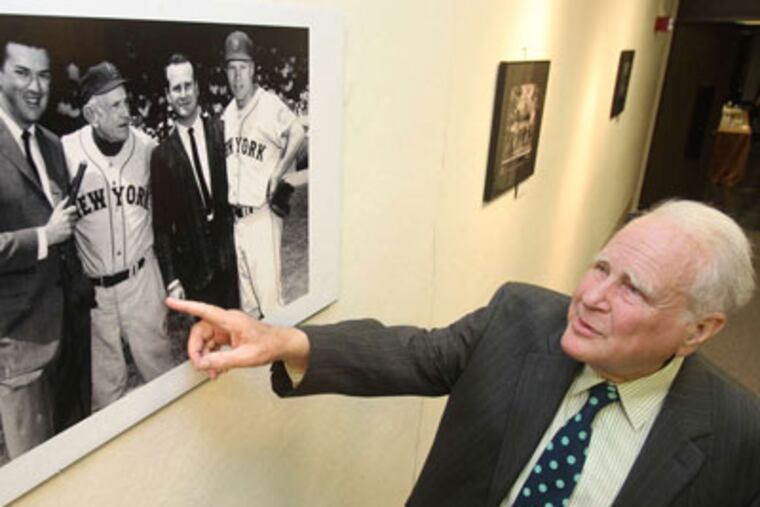After a life in TV, Lew Klein donates his papers to Temple
When Lew Klein started working in broadcasting, Harry S. Truman was president and television was not yet a household word.

When Lew Klein started working in broadcasting, Harry S. Truman was president and television was not yet a household word.
After a career that has run the gamut from producing and directing pioneering TV shows such as American Bandstand, to being part owner of a string of television stations, to educating broadcast students for more than a half-century, Klein, 84, has donated his papers to Temple University.
The collection spans most of the history of television. It includes about 10,000 items - letters, vintage film clips, memorabilia, and more than 1,200 photographs.
The archive, known as "The Lew Klein Papers," is part of the Urban Archives at Temple's Special Collections Research Center at the Paley Library.
"In my first experiences in television, there were only 3,000 [TV] sets in Philadelphia," Klein said. "I've really seen and been part of television, in essence, since it really became viable in Philadelphia."
Klein still teaches one undergraduate course for broadcast interns at Temple's School of Communications and Theater.
He has taught broadcasting at the university for 59 years. Lew Klein Hall, a 1,200-seat venue at the Temple Performing Arts Center, is named in his honor, as are the university's Lew Klein Alumni in the Media Awards, given to media leaders annually.
During a recent interview with his wife, Janet, at his side, Klein said: "I think what touches . . . us is that all of this material we know will be someplace and be there forever and available to students and researchers and people who want to reminisce."
The materials, which filled about 23 boxes, had been kept in his Montgomery County home. Klein said that, for him, among the most sentimental items is a photograph of a marionette he used when he worked as an assistant for a 1948 TV commercial for Dutch Boy paint.
In that year, he said, "there was only one weather program on in the whole country. It was on Thursday nights and it originated at Channel 3 here."
Klein said he was an undergraduate English major at the University of Pennsylvania at the time. "I did the commercial. I made a marionette that was the caricature of the little Dutch boy. That was the logo for Dutch Boy paints. And for $5 a week, I did the commercial with this marionette."
Also among his more cherished items are photos of Klein with Presidents John F. Kennedy, Lyndon B. Johnson, Richard M. Nixon, and Gerald R. Ford.
In 1972, Klein was one of the partners who bought Triangle TV stations from media mogul Walter Annenberg. The group owned four stations, serving Lancaster and Lebanon, State College, Altoona, and Johnstown in Pennsylvania; Huntington and Charleston, W. Va., and Binghamton, N.Y.
In Philadelphia, he made major contributions to television, producing and directing programs such as Sally Starr's Popeye Theater, Romper Room, and American Bandstand. He also directed national TV shows, including Stump the Stars in Los Angeles.
Klein has received the Gold Medal Award from the Pennsylvania Association of Broadcasters and the President's Award from the National Association of Television Program Executives, among numerous other honors.
Asked about the current state of television, Klein said: "Technology has made both sports and news more entertaining and efficient." However, he added that the rise of "reality programs" had compromised the rest of the TV content. "They don't have the quality and sense of good theater that, in my opinion, they ought to have," Klein said.
Tom Jacobson, interim dean of Temple's School of Communications and Theater, said Klein had been a "mainstay" there. "He provides advice and leadership to the school at many levels."
Jacobson said the archives "are, in some ways, a major document for the history of broadcasting in the Delaware Valley as well as a contribution to the documentation of broadcasting nationally."
Margery Sly, director of the Temple Special Collections Research Center, said many of the items in the Klein papers would be digitized and posted online. She said people could view the collection by appointment by contacting the research center.
Klein said he and his wife worked closely with Temple archivists for about two years to gather the material.
"As we did this, it brought back memories of all these programs and events," Klein said, "so we had a great time going through all of this to sort it out and remembering the last 60 years of our life."